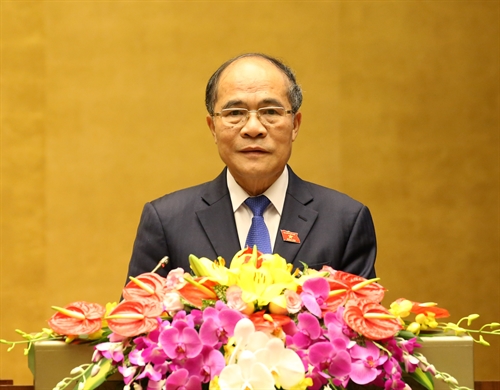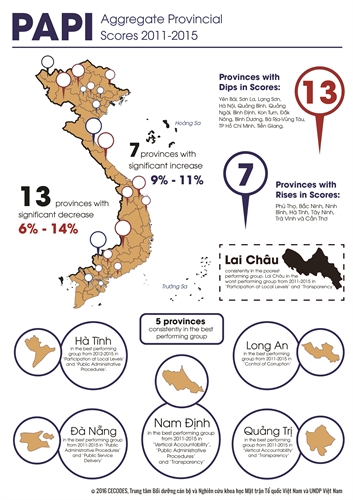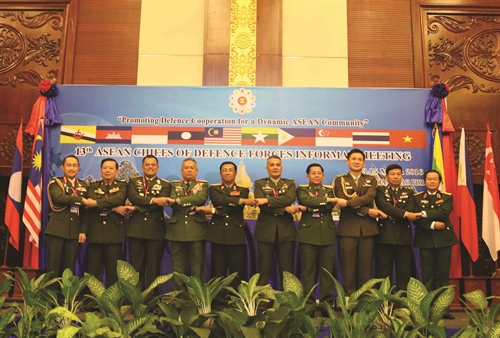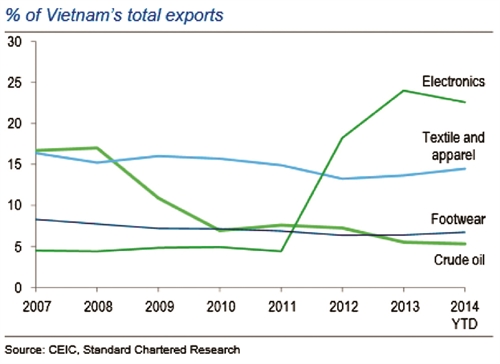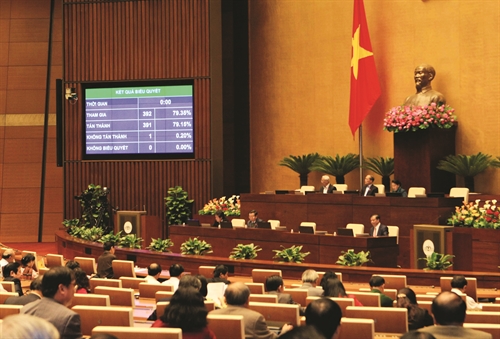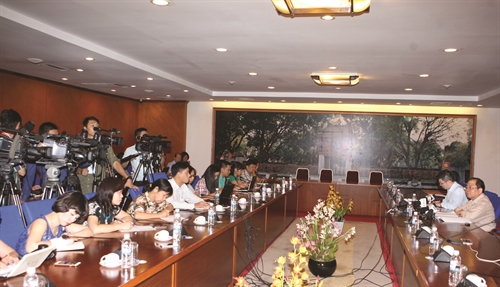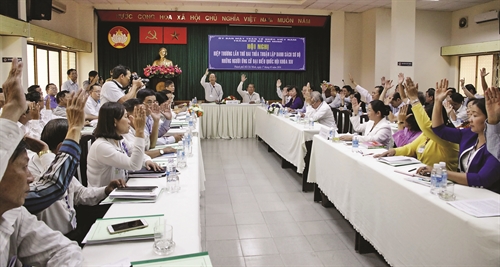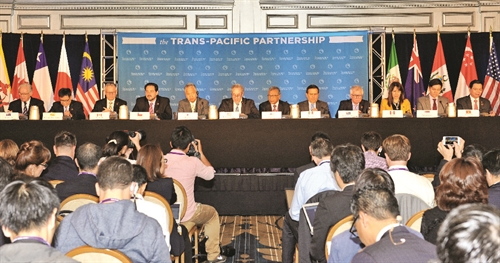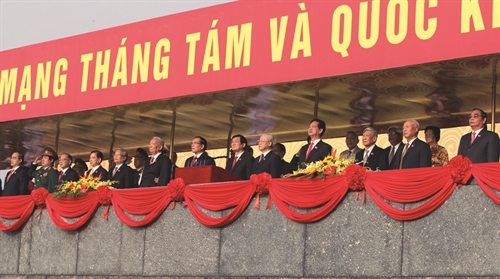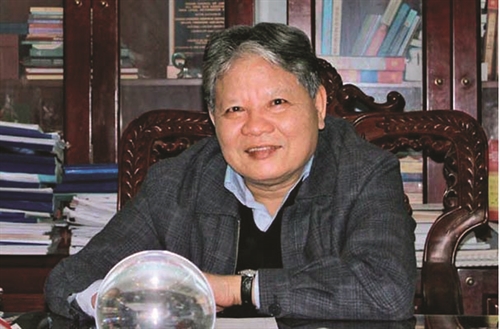Specific provisions on citizens’ freedom of the press and freedom of speech in the press, association in press activities, responsibilities to provide information to the press and prohibited acts in press activities are among new contents of the revised Press Law (the Law), said Minister of Information and Communications Nguyen Bac Son.
Adopted this month by the Vietnamese National Assembly, the Law has six chapters and 61 articles, including 32 new and 29 amended ones. It will enter into force on January 1 next year and replace the 1989 Press Law and its 1999 amendments.
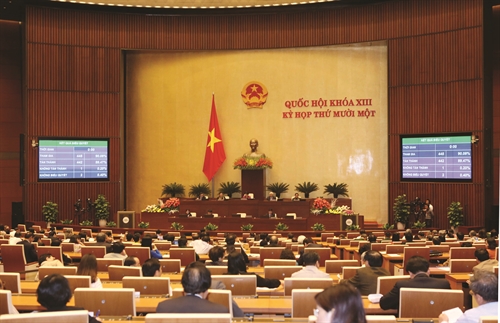 |
| National Assembly deputies vote to pass the revised Press Law on April 5 __Photo: Phuong Hoa/VNA |
New contents of the Law
First, the Law devotes Chapter II with four articles to defining citizens’ rights to freedom of the press and freedom of speech in the press. It states citizens are entitled to create press products, provide information to the press, give feedback on the press, access to press information, and join press agencies to create press products, and print and distribute newspapers. Citizens may also contribute to the press their opinions, criticisms, proposals, complaints and denunciations regarding Party organizations, state agencies, socio-political organizations and other organizations as well as their members.
Second, apart from entities eligible to establish press agencies under current law, the Law adds some entities eligible to establish science journals, including tertiary education institutions under the Law on Higher Education, scientific research institutions, academies and institutes under the Law on Science and Technology; and hospitals of provincial and higher levels. Furthermore, private and foreign-invested education institutions and scientific and technological organizations will be licensed to publish science journals.
Third, the Law adds provisions on joint press activities. Accordingly, press agencies may cooperate with one another or with other legal entities or individuals that have registered for doing business lines matching the fields and contents of cooperation defined in the Law. It specifies the maximum time volume for broadcasting contents produced under such cooperation projects on exclusive political and essential information radio and television channels, and the maximum time volume that radio and television agencies may cooperate to produce entire radio and television channels. Press agencies will not be required to ask for permission from press regulatory authorities for their cooperation activities.
Fourth, the Law contains new provisions on responsibilities of agencies, organizations and responsible persons to provide information to the press as well as types of information they may refuse to disclose to the press.
To protect information sources and journalists’ professional activities, as compared with the current law, the Law states press agencies and journalists may only reveal information sources when so requested in writing by the procurator general of a people’s procuracy or the chief justice of a court of the provincial or higher level for investigation and trial of very or especially serious criminal offenses. Meanwhile, the procurator general of the people’s procuracy or the chief justice of the people’s court of the provincial or higher level must organize the protection of information sources once their names are revealed.
Fifth, to heighten the role and civic responsibilities of journalists, in addition to provisions on journalists’ rights and obligations, the Law regulates issues related to professional ethics of journalists, saying that the Vietnam Journalists Association must issue and organize the implementation of regulations on professional ethics of journalists. It stipulates that journalists will have their press cards revoked if they violate their professional ethics leading to serious consequences.
Sixth, the Law makes more detailed provisions on business and service activities of press agencies. Income sources of press agencies and their affiliated units from business and service activities are clearly defined at Point c, Clause 2, Article 21.
Seventh, Article 9 of the Law adds prohibited acts in press activities, including publishing information to convict a person against whom there is not yet any court judgment, information affecting children’s normal physical and spiritual development, and information on mysteries stirring up social anxiety, affecting social order and safety and public health.
Information banned from publication specified in Clauses 1 and 2 of Article 9 is consistent with that prohibited under the 2015 Penal Code and other prohibited acts are consistent with those specified in the Civil Code and other laws.
Eighth, in order to protect lawful rights and interests of agencies, organizations and individuals about whom the press published false information, the Law adds new provisions on correction. It requires online newspapers to remove untrue information apart from posting corrections and apologies. Press agencies and online news pages using and publishing other press agencies’ information contents that must be corrected together with apologies must post the latter’s corrections and apologies as well. Places for displaying corrections for each type of the press are defined in the Law.
The Law also makes new provisions on handling of violations. Under the Law, press activity licenses and licenses for publishing additional press publications, supplements, additional radio and television channels, specialized online news pages of press agencies as well as licenses for publishing special publications and news bulletins of agencies and organizations will be revoked if their information violates Article 9.
Finally, the Law includes many provisions of the current government decrees and adds news provisions on press activities. It regulates state policies on press development, the change of parent agencies of press agencies; the cooperation between Vietnamese and foreign press; press activities of foreign journalists, foreign representative offices and organizations in Vietnam; and the protection of contents of radio and television programs and online newspapers.
Answering local media’s questions about the management of online information, Deputy Minister of Information and Communications Truong Minh Tuan said the Law was designed to manage information on press products and information products of journalistic nature. As explained in Article 3 of the Law, information products of journalistic nature are those expressed by different types of the press and published on bulletins and special publications or general information websites of agencies, organizations and enterprises.
As for activities of social networking sites, the Deputy Minister said, they were regulated by Government Decrees No. 72 of July 15, 2013, on management, provision and use of Internet services and online information, and No. 174 of November 13, 2013, on handling of administrative violations. In the coming time, the Ministry of Information and Communications would review the implementation of Decree No. 72 and report the results to the Government and the National Assembly. It was expected that another law would be worked out to manage online information in general and information on social networking sites in particular, Tuan said.
Asked about the planning of general information websites, the Deputy Minister said through the review the ministry would consider whether to plan these online pages as they just re-post press news sources together with names of writers and press agencies and the posting time of such information. All press activities must comply with the national master plan on press development and management up to 2025 which has been considered by the Political Bureau and discussed by the Party Central Committee, he said.
The Law was a legal foundation for implementing the contents of this master plan, he noted.- (VLLF)
